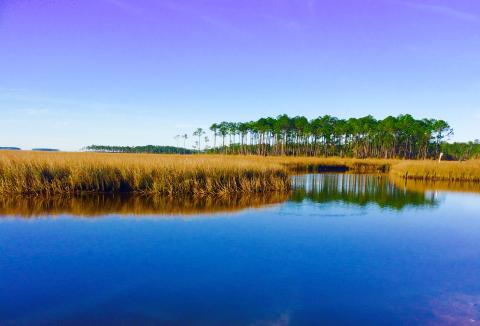The Mississippi Trustee Implementation Group has released its first restoration plan. The plan addresses some of the natural resource injuries resulting from the Deepwater Horizon oil spill in Mississippi.
The Mississippi Trustee Implementation Group 2016-2017 Restoration Plan/Environmental Assessment evaluates a range of restoration alternatives and identifies the preferred alternatives. After considering the analysis and public comments, we selected three projects for implementation:
- Wetlands, Coastal, Nearshore Habitat/Birds restoration type
- Graveline Bay Land Acquisition and Management ($11.5 million)
The project includes acquiring and managing up to 1,410 acres of land within the existing Graveline Bay Coastal Preserve and nearby privately- and publicly-owned lands in Jackson County, Mississippi. Restoration measures include invasive species management, prescribed fire, access restriction, debris removal and road repair and culvert placement. When implemented, restoration measures will reduce the threat of development, directly enhance habitat, decrease habitat fragmentation and increase habitat connectivity to other large conservation parcels in the area. Protection of shoreline habitat from vehicle traffic will also enhance shorebird nesting success.
- Grand Bay Land Acquisition and Habitat Management ($6 million)
This project includes acquiring up to 8,000 acres and managing up to 17,500 acres of land within the boundaries of the Grand Bay National Wildlife Refuge, Grand Bay National Estuarine Research Reserve, and Grand Bay Savanna Coastal Preserve in Jackson County, Mississippi. Restoration measures include invasive species management and prescribed fire. The primary objective is to protect important contiguous lands and waters in an effort to maximize efficiencies and effectiveness in restoring and managing those habitats for the benefit of coastal resources.
- Nutrient Reduction (Nonpoint Source) restoration type
- Upper Pascagoula River Water Quality Enhancement ($4 million)
The Upper Pascagoula River Water Quality Enhancement project will provide water quality improvement through the development and implementation of conservation plans and practices to reduce nutrient and sediment runoff into coastal waters. The project will be implemented in the Chunky-Okatibbee watersheds and will provide outreach and technical assistance to voluntary participants (landowners) to develop conservation plans within a 20,000-acre area. Conservation practices, especially those that reduce nutrient and sediment runoff, will be implemented on cropland, pasture/grassland, forestland, and associated agriculture land within the Chunky-Okatibbee watersheds.
Details on the projects and the environmental analysis are in the restoration plan and environmental assessment. The restoration plan and environmental assessment are consistent with the Trustees’ programmatic restoration plan.
This specific restoration planning effort began in May 2016, when we requested additional project ideas from the public. We considered all ideas submitted when screening and evaluating project proposals for this restoration plan and environmental assessment. We presented the framework for this plan during our annual meeting on November 15, 2016.
We held a 45-day public comment period on the draft restoration plan and environmental assessment, which closed on February 10, 2017. We considered the public comments and incorporated applicable revisions to the restoration plan and environmental assessment. On June 16, 2017, the Mississippi Trustee Implementation Group approved a Finding of No Significant Impact associated with the Mississippi Trustee Implementation Group 2016-2017 Restoration Plan/Environmental Assessment.


